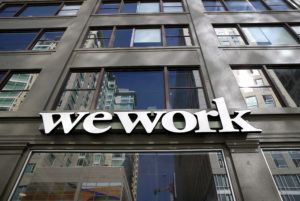WeWork may go down as one of the most overhyped companies in corporate history. Valued at nearly $50 billion at the start of the year, the BBC reports that it’s been acquired/rescued for a small fraction of that sum.
 Other companies associated with the digital economy have also had a rough time lately – especially those launching themselves on the stock market. It’s got so bad that some people fear a second dot-com crash. The original happened almost twenty years ago, when tech investors went into full-on panic mode. Could a renewed loss of confidence in this vital sector tip the entire economy into recession?
Other companies associated with the digital economy have also had a rough time lately – especially those launching themselves on the stock market. It’s got so bad that some people fear a second dot-com crash. The original happened almost twenty years ago, when tech investors went into full-on panic mode. Could a renewed loss of confidence in this vital sector tip the entire economy into recession?
For a calmer and deeper analysis, there’s a must-read piece by Derek Thompson in The Atlantic. His key point is that we need to draw a distinction between tech and what I’d describe as “tech adjacent” companies:
He goes on to describe WeWork as “a real-estate company caught wearing an Actual Tech Company costume before Halloween”.
Tech adjacent companies are a feature of “platform capitalism” i.e. the use of digital interfaces and other tech-y lures to orchestrate, and therefore dominate, real world consumer markets like taxi services (e.g. Uber) or holiday lets (e.g. Airbnb).
In a pure tech company, the development of new software/hardware is the end product and one that can be judged on its own merit. But in a tech adjacent company, the tech is a means to the real objective which is “owning” a market by controlling the exchange of information within it. However, the latter is hard to pull-off. Investors pile in hoping that it might happen, but if it doesn’t the bubble bursts.
Amazon is an example of a company that has triumphed in using tech to revolutionise a real world market (retail). However, Thompson points out that two-thirds of Amazon profits come from a pure tech product – cloud computing.
It’s a reminder of the extent to which technological progress in the 21st century is confined to cyberspace, while innovators whose “feet are stuck in the mud of the physical world” are struggling to remake reality.










Join the discussion
Join like minded readers that support our journalism by becoming a paid subscriber
To join the discussion in the comments, become a paid subscriber.
Join like minded readers that support our journalism, read unlimited articles and enjoy other subscriber-only benefits.
Subscribe